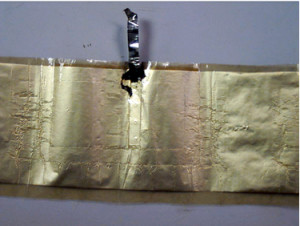AC Capacitor Failure
Gideon Analytical Laboratories performed failure analysis on ten failed microwave AC capacitors used in microwave applications. The capacitor used as a doubler failed in the circuit by shorting.
The capacitors were Samwha vintage 2100VAC .65uF with 3 percent tolerance with a maximum temperature rating of 85°C. All the capacitors were tested for shorts or opens. The resistance of the integrated resistor (internal and immersed in the dielectric fluid) was measured also. None of the integrated resistors failed. They all varied from 9.75-M ohms to 10.85M ohms. Many of the capacitors saw considerable heat. This was evident by the bulging deformed metal can housing. When several of these capacitors were taken apart the dielectric fluid burst out under pressure. In order for such pressure to exist internally, the dielectric fluid has broken down forming a gas, the volume of the byproducts is larger than the initial conditions or another gas was produced by another means.
All capacitor failures were identical in that the burned spot is always at the top of the aluminum foil, as revealed in the picture above. The presence of a residual black material on the rivet was detected. This material is coming from the encapsulation used on the surface of the resistor. When the black material is analyzed by SEM-EDS, XRF, and XRD it was found that all the black material contains copper and iron.
There exists a material incompatibility problem between the integrated resistor encapsulate and the dielectric fluid.
Failure analysis performed by Gideon Analytical Laboratories can provide companies in the electronics industry with extremely beneficial and candid results saving money, time and customer relationships.

Tab with copper and iron contamination